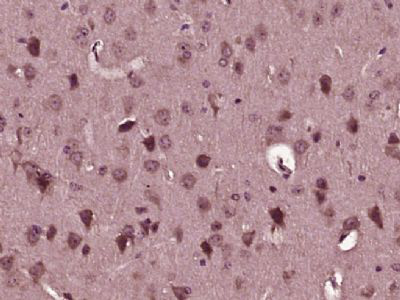产品货号 : mlR23726
英文名称 : SBNO2
中文名称 : SBNO2蛋白抗体
别 名 : FLJ00173; KIAA0963; Protein strawberry notch homolog 2; SBNO2; Sno; Stno.
研究领域 : 细胞生物 免疫学 转录调节因子 表观遗传学
抗体来源 : Rabbit
克隆类型 : Polyclonal
交叉反应 : Human, Mouse, Rat, Pig, Sheep,
产品应用 : ELISA=1:500-1000 IHC-P=1:400-800 IHC-F=1:400-800 ICC=1:100-500 IF=1:100-500 (石蜡切片需做抗原修复)
not yet tested in other applications.
optimal dilutions/concentrations should be determined by the end user.
分 子 量 : 150kDa
细胞定位 : 细胞核
性 状 : Lyophilized or Liquid
浓 度 : 1mg/ml
免 疫 原 : KLH conjugated synthetic peptide derived from human SBNO2:1041-1140/1366
亚 型 : IgG
纯化方法 : affinity purified by Protein A
储 存 液 : 0.01M TBS(pH7.4) with 1% BSA, 0.03% Proclin300 and 50% Glycerol.
保存条件 : Store at -20 °C for one year. Avoid repeated freeze/thaw cycles. The lyophilized antibody is stable at room temperature for at least one month and for greater than a year when kept at -20°C. When reconstituted in sterile pH 7.4 0.01M PBS or diluent of antibody the antibody is stable for at least two weeks at 2-4 °C.
PubMed : PubMed
产品介绍 : SBNO2 is a 1,366 amino acid protein that belongs to the SBNO family. Detected in macrophages, SBNO2 seems to have transcriptional repression activity. SBNO2 and ETV3 are components of the pathways that contribute to the downstream anti-inflammatory effects of IL-10. The expression of SBNO2 is regulated by IL-10 in a STAT3-dependent way. Existing as two alternatively spliced isoforms, the SBNO2 gene is conserved in chimpanzee, dog, cow, mouse, rat, chicken, zebrafish and C.elegans, and maps to human chromosome 19p13.3. GPx-4 and LKB1 are neighbors of SBNO2 on chromosome 19. Chromosome 19 consists of approximately 63 million bases and makes up over 2% of human genomic DNA. Key genes for eye color and hair color also map to chromosome 19. Peutz-Jeghers syndrome, spinocerebellar ataxia type 6, the stroke disorder CADASIL, hypercholesterolemia and insulin-dependent diabetes have been linked to chromosome 19.
Function:
SBNO2 appears to have transcriptional repression activity in macrophages.
SWISS:
Q9Y2G9
Gene ID:
22904
Important Note:
This product as supplied is intended for research use only, not for use in human, therapeutic or diagnostic applications.
产品图片












